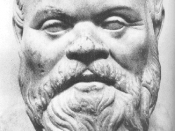Introduction Socrates understood philosophy as the love of wisdom. Wisdom consists in making 'sense of our existence, of our actions and of our destiny by a cautious balance of intuitive and discursive interpretations of our experience of being and of beings' (Ruch 1984: 28). The question whether there is an African philosophy is the question with which many scholars in Africa are wrestling: while some scholars admit the existence of African philosophy, others, like Hountondji, argue that African philosophy is an illusion. The main reasons for the refutation of African philosophy are based on the fact that unlike Western philosophy, African philosophy is not recorded and is not scientific. The appropriate question here would be: are Africans able to philosophise - 'making sense of their existence', or it is only Westerners? This is the question I intend to tackle in this essay. In order to achieve this goal, I will analyse the views of both Tempels and Ruch on African philosophy, and find their merging views.
Ruch's views on African philosophyIn the book African philosophy, Ruch affirms both the existence of an African philosophy and Western philosophy. He contends that although each has a different approach to reality, both have a mythological foundation. In the Western thought the mythical foundation of philosophy can be traced back to the Greek (Ionians) whose interest lay in studying the cosmos. In the African context, mythology has ancestors as its founders. Hountondji, however, reasons that a system can only be a philosophy if it is 'scientific, theoretical and individual discipline' (1984: 12). Automatically this view presents Africans as a people without a philosophy, because their beliefs and traditional practices are outside the parameters of Hountondji's characteristics of philosophy.
According to Ruch, regarding African philosophy as an illusion, as...


